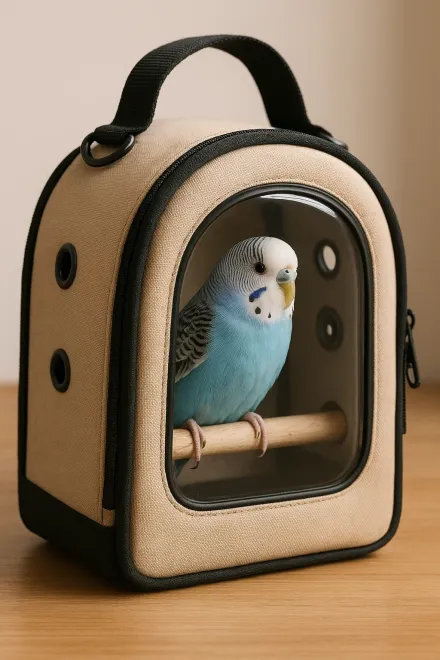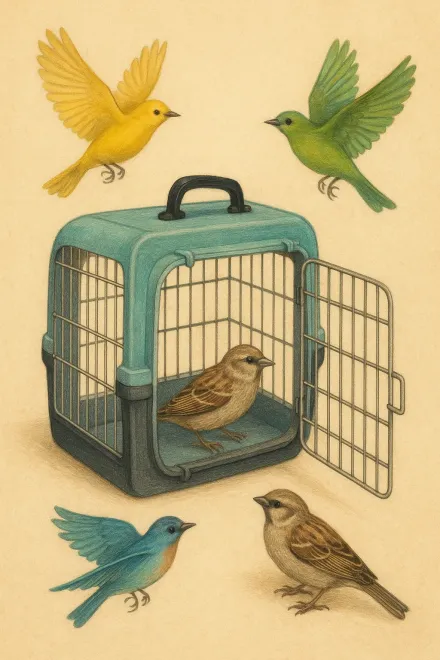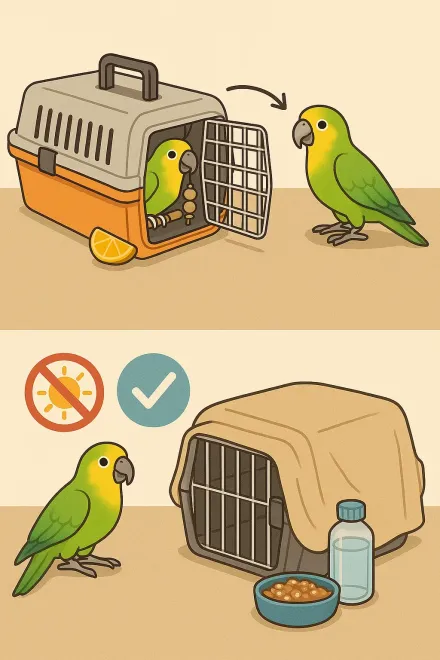Bird Carriers
Bird carriers are essential accessories to guarantee the well-being of our birds when we need to transport them, whether for a vet visit, a trip, or even short outings. A good carrier provides safety, proper ventilation, and comfort, both for the animal and the caretaker. Choosing the right model can make the difference between a stressful experience and a calm journey. In this guide, we will analyze the key features, available carrier types, and practical tips to make the best choice.
See the best bird carriers on Amazon
Features of a good bird carrier
A quality carrier must have certain features that ensure your bird's safety and comfort. Ventilation is crucial, since birds need constant airflow to avoid stress or overheating. Likewise, the material should be strong yet lightweight to make transportation easier. Cleaning is also important: a carrier with a detachable base or removable tray allows you to maintain proper hygiene more easily.
The size should fit the bird species. A canary or a budgie is not the same as a medium parrot, so it's best to choose a model where the bird can move slightly, without leaving too much space that may cause instability. It is also advisable to have secure locking systems, preventing the bird from escaping while still allowing the caretaker to open it easily.
Finally, extra accessories like internal perches, built-in water dispensers, or covers to reduce outside exposure can greatly improve the bird's travel experience.
Types of carriers for pet birds
There are different types of bird carriers on the market, each with advantages and limitations depending on the situation. Rigid plastic carriers are very popular because they provide durability and strength, as well as easy maintenance. Fabric or nylon carriers, with foldable frames, are practical for occasional trips and for those looking for lightness, although they are usually less resistant to pecking or scratching.
On the other hand, there are carriers designed specifically for parrots, which include perches instead of floor grids, allowing the bird to travel comfortably standing. There are also transparent models, which allow greater visibility, ideal for birds that do not get stressed by the outside environment. In contrast, semi-covered models or those with opaque covers help nervous birds stay calm during travel.
In short, choosing the type of carrier will depend on the size, temperament, and needs of each bird, as well as on the frequency and distance of the trips to be made.


Tips for safe carrier use
Once you have chosen the right carrier, it is essential to use it properly. Before a long trip, let your bird get familiar with the carrier at home. You can leave it open in a quiet room, with treats or toys inside, so the bird associates it with something positive.
During the journey, avoid exposing the carrier to direct drafts or intense sunlight, as this may create a stressful or even dangerous environment. Placing a light blanket over the carrier can help reduce visual stimuli and keep the temperature stable.
For long trips, make sure to carry proper food and water, although it is best to consult a veterinarian for the best practices for each species. It is also advisable to check the carrier's condition regularly, ensuring the grids, locks, and accessories are in good condition to prevent accidents.
Benefits of using a specialized bird carrier
The main benefit of having a specialized bird carrier is safety. Unlike improvised boxes or regular cages, carriers are specifically designed for travel, with proper ventilation systems and secure locks. This prevents escapes and reduces risks during transport.
Another key benefit is the bird's comfort. Many carriers include perches adapted to the bird's size, allowing it to travel naturally without straining its legs. In addition, since they are designed with proper dimensions, they minimize sudden movements during travel.
From the caretaker's perspective, a carrier makes handling easier. They are easier to carry, clean, and transport than a regular cage, and some models include ergonomic handles or even shoulder straps. For car travel, most carriers fit well on the seat and can be secured with seat belts, adding extra peace of mind.
Lastly, a proper carrier contributes to the bird's health, as it reduces stress levels during unavoidable trips, such as vet visits or moving. Investing in a good carrier can result in safer and less traumatic journeys for your pet.
How to choose the best carrier for your bird
Choosing the best carrier requires considering both your bird's characteristics and your lifestyle. For small birds like canaries, finches, or budgies, a compact, lightweight carrier with good ventilation will be enough. For medium or large parrots, however, it is best to opt for more resistant models, with internal perches and durable materials.
It is also important to consider how often it will be used. If it will only be used for occasional vet visits, a simple model may suffice. But if you plan to travel frequently or on long trips, it is worth investing in a higher-quality carrier, with extra features like removable trays, food compartments, and ergonomic design for the caretaker.
Another key aspect is ease of cleaning. Birds produce waste that can accumulate quickly in a confined space. A carrier with a removable base simplifies hygiene and ensures a healthy environment for the bird. Likewise, portability is essential: handles, adjustable straps, and low weight make transportation easier without compromising safety.
Finally, do not forget to consider your budget. On Amazon you can find very affordable options, but also premium models that offer greater durability. The most advisable thing is to prioritize quality over price, since a well-chosen carrier can last many years and prevent health problems or accidents for your birds.
Frequently asked questions about bird carriers
What is the best material for a bird carrier?
The best material will depend on the species and intended use. Rigid plastic carriers are durable, easy to clean, and provide good safety, making them ideal for frequent travel. Fabric or nylon carriers are lighter and easier to carry, though less resistant to pecking. The important thing is to make sure the material allows proper ventilation and is safe for the bird.
What size should my bird carrier be?
The carrier should be spacious enough for the bird to move with some freedom, but not so large that it causes instability during travel. As a general rule, it should allow the bird to stand comfortably and turn around, while avoiding excessive space where it could get injured during sudden movement.
Is it necessary to include a perch inside the carrier?
Yes, for medium and large birds, such as parrots or cockatiels, a perch is essential for traveling comfortably and naturally. For small birds, like budgies or canaries, a stable floor may be enough. However, a well-placed perch reduces stress and allows the bird to maintain its usual posture during travel.
How can I reduce my bird's stress in a carrier?
You can reduce stress by letting the bird get familiar with the carrier at home before a trip, placing toys or treats inside. During travel, avoid loud noises, sudden temperature changes, and unnecessary movements. Partially covering the carrier with a light blanket also helps the bird feel calmer and more protected.
Can I use a bird carrier for air travel?
Yes, but it is essential to check the airline's regulations, as many have specific requirements for transporting birds. Some carriers meet the accepted measurements and features for cabin use, while others are only suitable for the hold. It is recommended to choose an approved model and confirm with the airline before the flight.
How often should I clean my bird's carrier?
Cleaning should be done after each use to prevent the buildup of food or droppings. If the carrier is used frequently, a deep cleaning once a week is recommended, removing trays, grids, and accessories for disinfection. A clean environment prevents disease and ensures the bird's well-being during each trip.
Are fabric bird carriers safe?
Fabric carriers can be safe for small birds and short trips, provided they have a firm structure and strong locks. However, they are not the best option for parrots or other species with strong beaks, as they may tear the material. For greater safety, rigid plastic or coated metal carriers are usually preferred.
